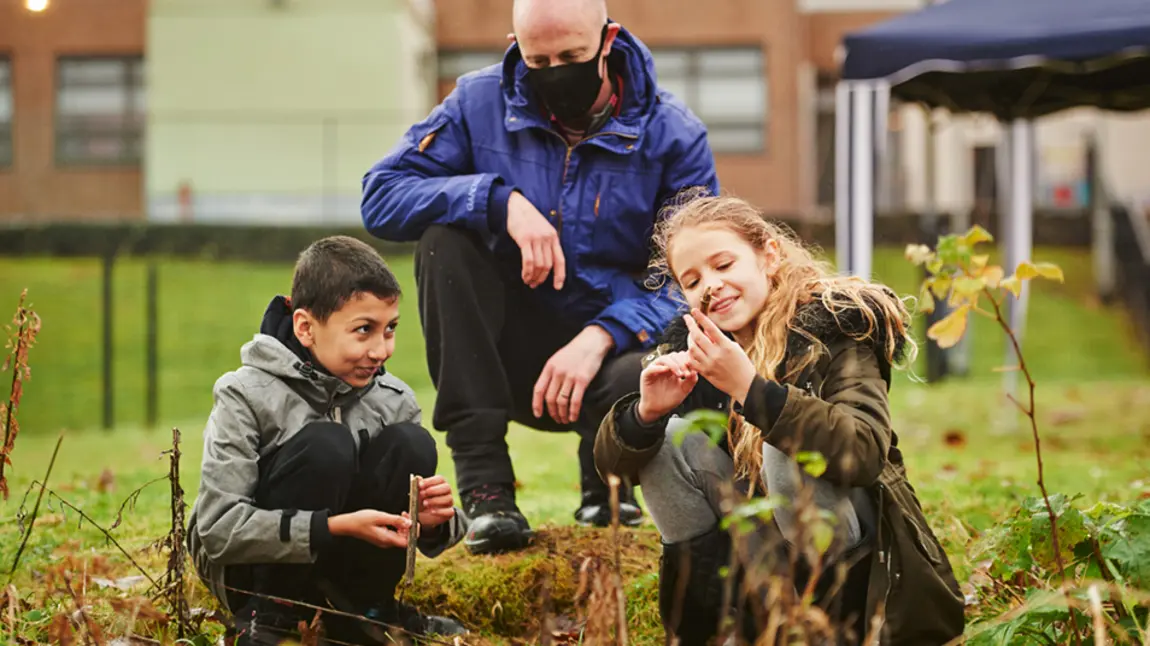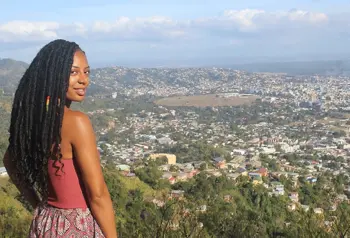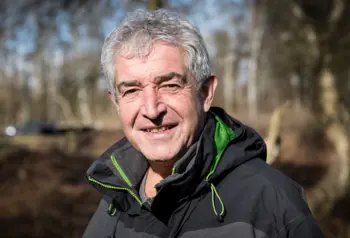Nature restores hope for children disproportionately impacted by COVID-19

My School, My Planet worked with 49 school across the country from September to November 2020. It was delivered by Learning through Landscapes with a £275,000 grant from The National Lottery Heritage Fund.
The programme aimed to help children re-engage with learning after a significant period away from school during the coronavirus (COVID-19) lockdown and encourage a greater connection to their natural heritage.
“Time spent outdoors can improve the physical and mental health of our most disadvantaged children, as well as helping increase their knowledge and giving them a sense of ownership over their planet.”
Carley Sefton, CEO at Learning through Landscapes

How nature helps
An evaluation of the pilot programme found:
- Increases in children’s knowledge of the programme’s three core subjects. Children correctly answering a majority of test questions improved for biodiversity (from 40% to 65%), climate change (from 30% to 58%) and soil (from 7% to 31%).
- A 36% increase in participants’ frequency of physical activity by the end of the programme. In one school, the trainer reported children covering several miles a day for My School, My Planet.
- Positive shifts in children’s wellbeing, including students reported to be “very motivated” on days that involved My School, My Planet.
“It is a birth right that all people should have access to nature. I find it heart-breaking that some of the most vulnerable children in our communities are once again missing out."
Carley Sefton, CEO at Learning through Landscapes
The 1,029 children who participated in the programme ranged in age from six to 13 years old (the average age was nine). They self-identified from 47 different ethnic backgrounds, and over a third were eligible for Free School Meals (more than double the national average). In one school, of the 29 children taking part, only five reported going outside most days during the six months that they were off school.
Carley Sefton, CEO at Learning through Landscapes, said: “It is a birth right that all people should have access to nature. I find it heart-breaking that some of the most vulnerable children in our communities are once again missing out.
“The My School, My Planet evaluation shows that dedicated outdoor learning programmes can redress the balance, that time spent outdoors can improve the physical and mental health of our most disadvantaged children, as well as helping increase their knowledge and giving them a sense of ownership over their planet.”
My School, My Planet helped the children link their learning about local biodiversity and migratory species to the countries their families had come from. Children learned that birds they spotted during the project spent part of the year in places such as Morocco and Somalia.
They also discussed how the biodiversity of their local area compared to the places their families had originated from. The My School, My Planet trainer supported these discussions by bringing in a large map of the world, which the children annotated to share their heritage.
A trainer from Ark Bentworth said: “What I saw between the first week and the last week was people building a pride in place, a pride of where their school was and what they were doing with it, but also a pride in the places their families come from.
"I had one boy say 'Miss, Miss! Did you know there’s been a mouse just found in Somalia that hasn’t been seen for 50 years?' I don’t think he would have shared that as a thing to be proud of from Somalia without My School, My Planet.”
Children worked with a My School, My Planet trainer to revitalise a raised garden bed and replant it with herbs. The trainer taught children how to separate and transplant the herbs into the bed and how to look after them.
This understanding of the link between the natural world and the food they ate was further reinforced by children planting vegetables and then using them to make soup or stew in home economics classes.
My School, My Planet also gave children opportunities to spend time outdoors with their peers, which had a number of benefits, including increased physical activity, and improvements in their ability to work together.
A trainer at Craigmarloch said: “Their teamwork and working together on a physical activity was really good. It did improve drastically. It didn't matter what the weather was like, they were up for it. They wanted to go on with it. And they were literally like spring lambs and they were leaping into the garden.”

Alternative ways to learn
The My School, My Planet evaluation – conducted by The Centre for Education and Youth and published today (25 February) – offers insights that could be effective in supporting pupils when they return to schools on 8 March in England.
Sian Riddell, a teacher at the participating Balderstone Primary School in Blackburn, said: “When we returned to school after lockdown in September 2020, we could have all easily got distracted by catch up lessons. My School, My Planet helped us to prioritise the children’s emotional and mental health and wellbeing by getting outside and immersing ourselves in nature.”
Ros Kerslake, Chief Executive at The National Lottery Heritage Fund, said: “We chose to support this innovative and inspiring project because of the way it uses the outdoors to engage pupils with nature and climate change in a very real way. Outdoor learning is a brilliant way to help children get back in to an educational setting after so much time away from the classroom and staring at screens.
“It is critical that all children are taught the value of nature all around us and understand the impact of climate change so that all have a say in the future our of planet.”
Our commitment
We want all our projects to do their very best to help mitigate against, and adapt to, the effects of our changing climate and to help nature recover.
In 2021-22, our National Lottery Grants for Heritage – which reopened for applications at all levels earlier this month – are prioritising applicants that demonstrate they are environmentally responsible and are integrating environmental measures into their projects.

